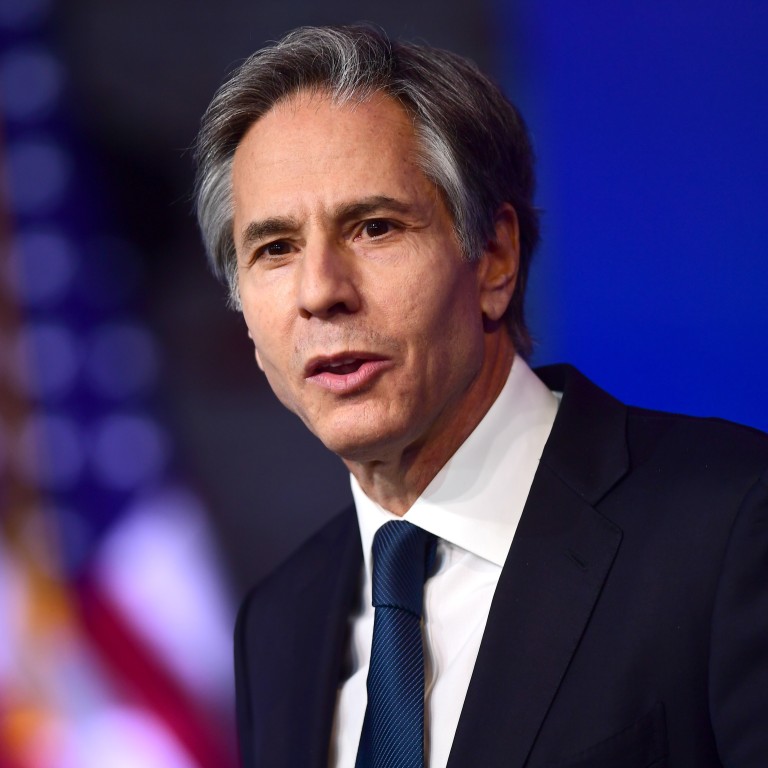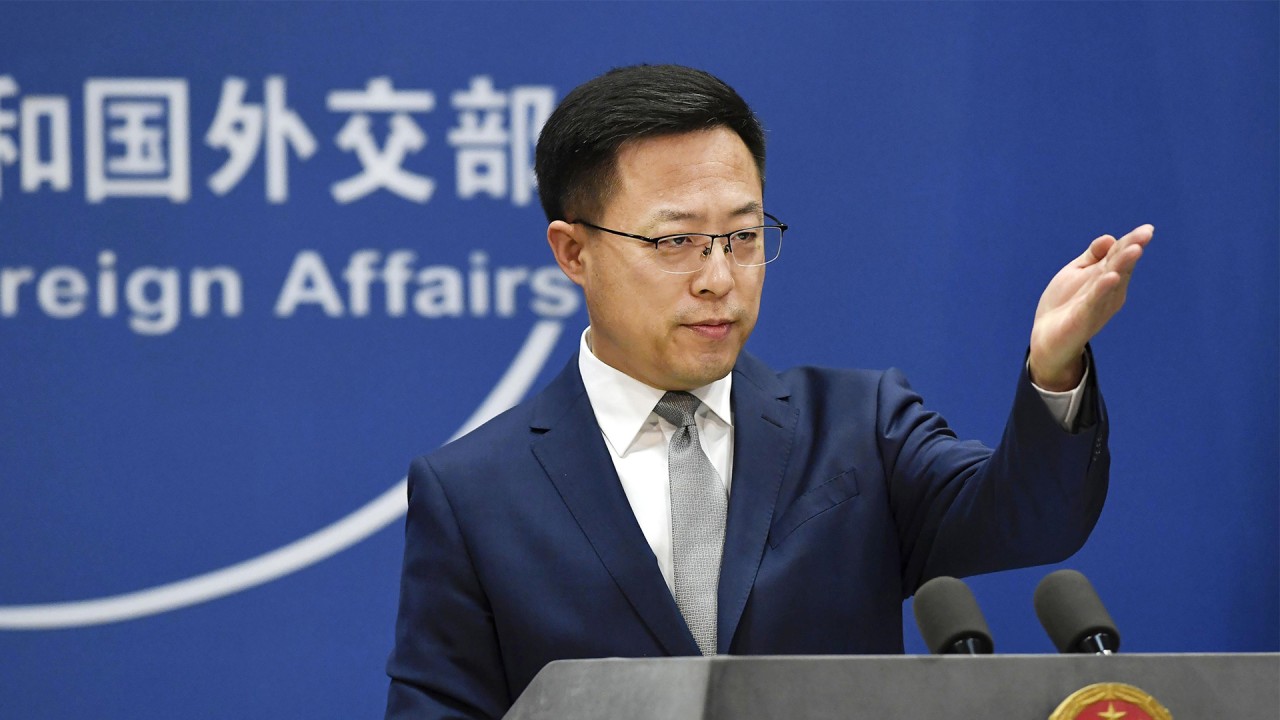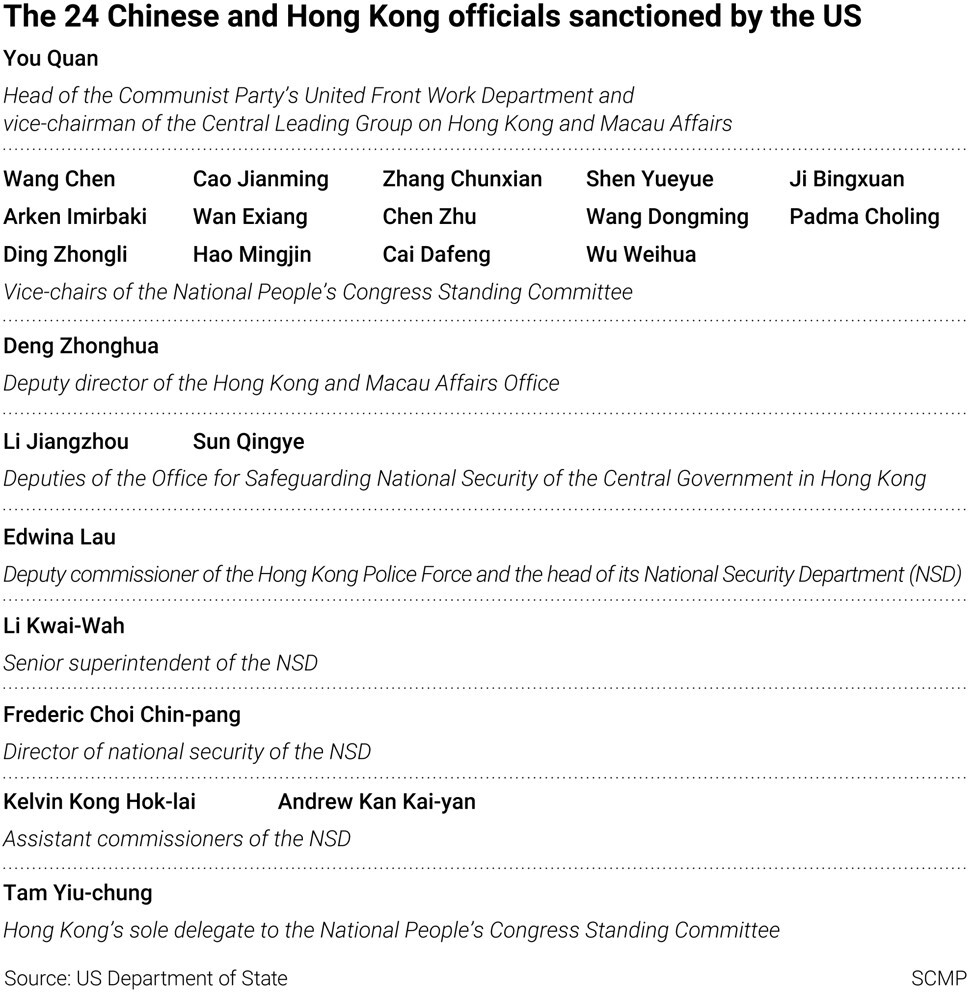
Washington imposes new sanctions against 24 officials over Hong Kong electoral overhaul
- US Secretary of State Antony Blinken says the actions of the individuals named ‘have reduced Hong Kong’s high degree of autonomy’
- The sanctions come on the eve of a high-level meeting in Alaska between Blinken and US National Security Adviser Jake Sullivan and China’s top diplomats, Yang Jiechi and Wang Yi
Analysts said the latest shot across the bow from US President Joe Biden’s administration, coming on the eve of talks between top Chinese and American diplomats, signalled its intention to continue playing hardball with Beijing over Hong Kong.
It raises the stakes in United States Secretary of State Anthony Blinken’s coming meeting with his Chinese counterparts. Blinken and US National Security Adviser Jake Sullivan are expected to meet China’s top diplomats, Yang Jiechi and Wang Yi, in Alaska on Thursday.

01:01
China warns US to stay out of Hong Kong affairs ahead of Alaska talks
The latest sanctions were announced after Blinken updated Washington’s Hong Kong Autonomy Act report to amplify its “deep concern” over the endorsement of a resolution by the National People’s Congress (NPC) last Thursday to shake up the city’s political structure.
“Today’s update identifies 24 PRC and Hong Kong officials whose actions have reduced Hong Kong’s high degree of autonomy, including 14 vice-chairs of the National People’s Congress Standing Committee and officials in the Hong Kong Police Force’s national security division, the Hong Kong and Macau Affairs Office (HKMAO), and the Office for Safeguarding National Security,” Blinken said in a statement.
“Foreign financial institutions that knowingly conduct significant transactions with the individuals listed in today’s report are now subject to sanctions.”
Blinken added that the shake-up of Hong Kong’s political structure “further undermines the high degree of autonomy promised to people in Hong Kong and denies Hongkongers a voice in their own governance, a move that the United Kingdom has declared to be a breach of the Sino-British Joint Declaration”.
US-China relations: No ‘unrealistic expectations’ for Alaska meeting
That drew immediate condemnation from Beijing, which said it had already taken necessary retaliatory measures.
“[The sanctions have] fully exposed the US’ evil intention to meddle in China’s internal affairs and disrupt Hong Kong,” foreign ministry spokesman Zhao Lijian said.
A Hong Kong government spokesman also condemned the latest sanctions.
“We are extremely disappointed that the current US administration, instead of rectifying the blatant mistake made by its predecessor, has chosen to pursue the same wrongful path of disregarding international norms and interfering in [Hong Kong] affairs,” the spokesman said, adding the sanctions would not create any obligations for financial institutions under the city’s laws.
“They will continue to operate normally and smoothly despite any undue pressure from the US.”
Among the 24 mainland and Hong Kong officials are: Tam Yiu-chung, the city’s sole delegate to the NPC Standing Committee; Wang Chen, vice-chairman of the standing committee, who spearheaded the electoral overhaul; five top officers from the national security unit of the local police force, including Deputy Police Commissioner Edwina Lau who heads it, Senior Superintendent Steve Li Kwai-wah and the force’s Director of National Security Frederic Choi Chin-pang; Li Jiangzhou and Sun Qingye, deputies of Beijing’s Office for Safeguarding National Security in Hong Kong; HKMAO deputy director Deng Zhonghua; and You Guan, head of the Communist Party’s United Front Work Department.
All 24 had previously been sanctioned by the Treasury Department or through executive orders authorised by Donald Trump, Biden’s predecessor.
In response, Tam slammed Washington’s “shameful” attempt to pressure financial institutions with the latest sanctions.
“I repeat that no country enjoys the right to meddle in Hong Kong’s internal affairs with any excuses,” he said in a statement. “I will continue to take part in my work in the NPC and make contributions to the country and Hong Kong sincerely.”
A police spokesman also hit back, saying the US was trying to interfere with law enforcement work through political means and the force would continue to safeguard national security, which he described as a “responsibility and honour” of every officer.
Shi Yinhong, an international relations expert with Renmin University in Beijing, said the latest sanctions reflected the Biden administration’s tough policy on China.
Plan to be finalised ‘by May’ for Beijing overhaul of Hong Kong elections system
Samuel Chu, managing director of the Washington-based activist group Hong Kong Democracy Council, described the sanctions as a “timely and clear rebuke to the malfeasances of the Chinese Communist Party and the Hong Kong government” over the past weeks.
“The timing of the announcement, coming on the eve of the meeting between high-level American and Chinese officials in Alaska on Thursday, shows that the United States will not back down when it comes to Hong Kong, and the Biden administration will not look the other way on matters of human rights,” he said.
In its report on Hong Kong’s autonomy last October, the State Department identified 10 Hong Kong and mainland officials – including Lam, HKMAO director and deputy director Xia Baolong and Zhang Xiaoming, and director Luo Huining of Beijing’s liaison office – as responsible for undermining the city’s autonomy. The State Department said it would identify “any foreign financial institution that knowingly conducts a significant transaction” with them.
The story has been updated to reflect that financial sanctions were imposed on 24 individuals, rather than 14, under the Hong Kong Autonomy Act report.



